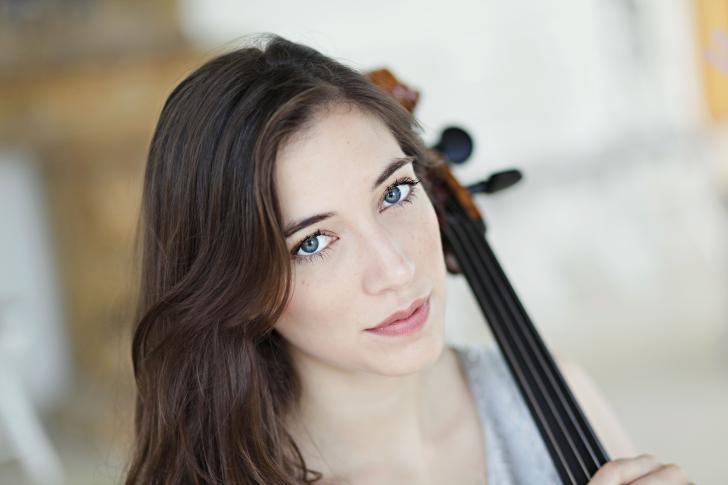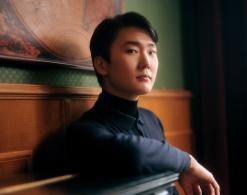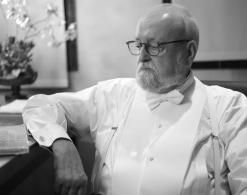Camille Thomas : “A story about these things we cannot explain”
Łódź Philharmonic offers a great artist residency to follow. Camille Thomas - a young Franco-Belgian cellist who lately created the album “Voice of Hope” will perform in Philarmonic a few times in this and upcoming year. In an interview, he’s talking about her educations, concerts, and almost religious approach to music. Polish version here.
Wojciech Gabriel Pietrow: On the 3rd of December you play in Łódź Philharmonic. It won’t be your 1st encounter with that space and that orchestra.
Camille Thomas: No. It will be already the 3rd time. I had the pleasure to play with the orchestra and Paweł Przytocki. For the first time, I played one year ago Beethoven’s Triple Concerto in the middle of the pandemic. In June I had an opportunity to play for the public. I have played the "Voice of Hope" program.
How do you recall those performances?
My first concert was a very special experience. It was live-streamed with no public, but I could feel for the first time (since the pandemic started) the warmth and the joy of playing chamber music. It was a very special moment. The June concert was also special because I was so happy to meet public and to play material from “Voice of Hope”. So now I’m really looking forward to the residency in Łódź Philharmonic.
At the next concert, you are going to play on the main stage in the concert hall. But throughout your career, you’ve been playing on the rooftop, desert, or in the museum. Do you pay attention to the place where you play?
My main goal is to share the music with the audience in the most dedicated and pure way. So of course, the concert hall is the temple of music, and it is where we can create these moments of eternity and create the magic of stopping the time. We can share something completely unique with the audience and the people we’re playing with.
At the peak of the pandemic, all of that was not possible. So, I started playing on my roof because I was locked down in my apartment. I try to find beauty in everything and for me, that roof was so special, and I wanted to share it. I saw being there and playing there made me feel good and I wanted other people also to feel that way. I didn’t think so much about that. A little bit later concerts were still not possible, and museums were closed. I thought: “why not combine these two things that are asleep and make them alive again”. I just tried to continue creating beauty.
I think that by playing in those places you develop new meanings in that music.
It’s something I have always had in me – this desire to create bridges between different forms of art. For me, the main goal is to create the strongest emotions possible. I think when you combine things and combine arts you can reach even higher. I had a feeling that f.ex. in Louvre those antic sculptures and the music was fitting each other.
So, are there any other places where you want to play?
Yes! So many places! I like playing with symbols so I thought that after playing on my roof in Paris I would like to play on the roof of the United Nations Headquarters in New York… or Geneva… or in other art places. Even ugly places. There are so many possibilities because by taking the music out of the concert halls you just change the perspective of the whole experience.
I want to ask you a little bit about your music education. I was learning to play the saxophone for almost 10 years, but I have never found joy or pleasure in that. Everybody told me that if I practice more, I will play better, and then it would be joyful. I have never found that feeling. In your stories, it seems like you have loved your instrument and playing on it from the beginning. Is that really true?
Yes! Somehow it has always been part of myself. It is my safe space where I can express things, I feel I need to share.
Even as a young person didn’t you have those moments when you didn’t want to practice anymore, and you just wanted to go out and have some fun with friends?
Oh, yes of course I did! But I always knew that practice makes a master and if you want to achieve great things you have to sacrifice some things. And actually, I was always happy with this whole practicing.
Have you ever thought about teaching others?
I’d love to give a masterclass someday but for now – no. For now, I’m performing mostly.
You’ve said more than once that you treat music like a religion.
Art in general is a language that speaks about things you cannot describe with words. So, for me, every note is like a prayer. Music is a story about these things we cannot explain (why are we here? etc.). Every piece of music is a question mark. Every piece is a way to become a little bit eternal. These works we play like Beethoven or Mozart – they are still alive. But also, it’s a language that goes beyond religions and cultures. It just speaks from hearth to hearth without any complications. It’s almost a religion. But I would say it’s more like a prayer. It’s a way to become bigger in life.
Music brings the best in people?
Of course!
How does it happen?
It just provokes some things when you are listening to the music on the highest level. Somehow your heart opens then. I remember something Bernstein said about Mahler symphonies – they have the power to enlarge hearts. It’s a feeling. Feeling so big… so deep. And this feeling is expressed without thinking. That direct experience gives a man great energy and hope. Nobody can be insensitive to that pure beauty.
I think it’s hard to express with words. It is a more spiritual thing.
Yes, of course!
What are you looking forward to on the 3rd of October? Do you have some hopes or predictions?
I’m looking forward to Elgar’s Concerto. It’s one of my favorite pieces. Of course, because of the famous interpretation of this piece by Jacqueline du Pré – she was my god and idol for all my teenage years. It’s always a specific journey to play this concerto. It’s one of the last pieces Elgar wrote. At that time his wife was very sick – she was dying. There are two main feelings in this concerto: the last days of his love that you can experience in the last movement of the concerto (in the end you can feel him saying goodbye) and also the feeling of emptiness and lack of sense he had after first world war. And now – after 100 years – we can still understand what he felt. In Łódź it will be my first-time playing Elgar this season – so I feel we will make it very special.
And what about future projects with Łódź Philharmonic?
It will be an exciting season! After the upcoming concerto, I will come back and play Brahms Double Concerto with Bomsori Kim. I have played with her already in Gdańsk one year ago and she is an amazing musician. After that, I will play Double Concerto again but with Vadim Repin. In further projects, I will perform Dvorak, and for the first time “Grave” by Lutoslawski. So, it will be an important experience. I’m really looking forward to this residency.





